With reversal on Sessions policy, we get divine intervention for women in danger | Christine Flowers
On Wednesday, a federal judge reversed a decision by former Attorney General Jeff Sessions which made it virtually impossible for women who feared gang violence or domestic abuse to seek asylum in the United States. For that we should say: Hallelujah.

Shortly after Jesus was born, Mary and Joseph took their infant son and fled Israel. According to the Gospel of Matthew: “Now when they had departed, behold, an angel of the Lord appeared to Joseph in a dream, saying, ‘Arise and take the young child and his mother, and flee into Egypt, and stay there until I tell you, for Herod will seek the young child to destroy him.’"
This idea is the foundation of Christian faith: that from the earliest of times, people have been forced to abandon cherished families and homelands to seek refuge from the human storm. Christians are taught that the Christ child was taken by his frightened parents across a country’s border to prevent him from being killed by a tyrant.
The Holy Family, the alpha and omega of my own spiritual universe, were refugees.
That has never been lost on me, an immigration lawyer and a Catholic. You don’t need to be Christian to understand the importance of welcoming the dispossessed, and you don’t need to be an immigration lawyer to recognize the compelling parallels between the Nativity story and the current crisis at our own border. But what better time than Christmas to tie the threads together in this compelling narrative of survival?
And it’s as if the angels worked in cooperation with judges last week, something which rarely happens in this country, where chaos often reigns supreme and compassion is a dirty word.
On Wednesday, a federal judge reversed a decision by former Attorney General Jeff Sessions that made it virtually impossible for women who feared gang violence or domestic abuse to seek asylum in the United States. Some of those women were pregnant, some carried children with them, and some had been told that if they stayed in their hometowns, they would be raped, beaten, or killed with the sanction of their own governments. Their destinies were clear to them from what had happened to sisters and aunts, neighbors and friends: Stay too long, and you will be killed. Go to the police, and they will do nothing to help you.
Sessions believed, wrongly, that these women (and in some limited cases, men) had not established eligibility for asylum under the law. He upended decades of jurisprudence to close a door to those seeking refuge as a member of a “particular social group,” an esoteric but extremely important basis for determining that someone deserves protection in the U.S. It was an attempt to stop the flow at the border, but it was built on the backs of victimized women. In an earlier column, I worried about the outcome for a woman from El Salvador who had been raped by her husband, the woman from Honduras prostituted out by MS-13, and the woman in Pakistan forced to marry at 14 and desperate to go to school.
Jeff Sessions' decision to close that door was a devastating departure from our country’s concern for the persecuted. Fortunately, a higher power intervened, as they tend to do (especially around this time of year).
U.S. District Judge Emmet Sullivan, the same man who delayed the sentencing of Mike Flynn this week, ruled that the former attorney general’s draconian limitations on when and how a victim of abuse can apply for asylum violated federal immigration law, something pretty much any and every immigration attorney could have told Sessions if he’d only asked us.
You might not believe in miracles. You might think that the Nativity story is just a fairy tale woven from the threads of fearful men seeking an explanation for their existence. You might laugh at those of us who believe that a woman named Mary took her child and, with her beloved husband, traveled across the border to a place where no potentate could strip her of her humanity.
And that’s OK. But it seems a federal judge just used that fairy tale as legal precedent. As they say in the legal profession, hallelujah.